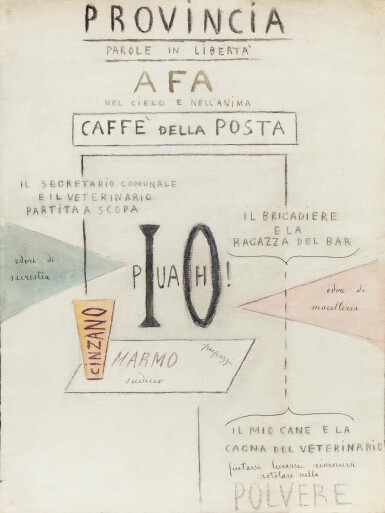Zang Tumb Tuuum : la révolution futuriste
Zang Tumb Tuuum : la révolution futuriste

Volt [Vincenzo Fani Ciotti]
Caffè della Posta. Parole in libertà. 1916.
Lot Closed
December 7, 03:19 PM GMT
Estimate
8,000 - 12,000 EUR
Lot Details
Description
Volt [Vincenzo Fani Ciotti]
Provincia. Caffè della Posta. Parole in libertà.
1916.
Gouache, coloured pencils and ink on mould-made paper. 59 x 44 cm.
Synthetic theatre. Volt portrays himself ('Io', me) in the midst of the hustle and bustle of a provincial café: in the sweltering heat (“afa”), seated at a dirty marble table, he sips an aperitif, filled with the smell of the sacristy or the butcher's shop, while around him customers play cards (“partita a scopa”) or chat at the bar, or his dog plays with the vet's dog: “Puah”.
These words-in-freedom were composed for Archi Voltaici, which Vincenzo Fani Ciotti published under the pseudonym of Volt in 1916 (Edizioni Futuriste di Poesia, fold-out plate p. 37), shortly after joining the Futurist group. The work illustrated the author's views on the “sintesi teatrali”, referring to the 1915 "Le Théâtre Futuriste synthétique" manifesto, in which Marinetti, Settimelli and Corradini advocated a condensation of dramatic action, with a rapid succession of scenes.
_____________________________________________________________
Volt [Vincenzo Fani Ciotti]
Provincia. Caffè della Posta. Parole in libertà.
1916.
Gouache, crayons de couleur et encre sur papier à la forme. 59 x 44 cm.
Une "synthèse théâtrale". Volt se représente ("Io", moi) au milieu du tumulte qui règne dans un café provincial : sous une chaleur accablante ("afa"), attablé à une table de marbre sale, il sirote un apéritif, envahi par des odeurs de la sacristie ou du boucher, tandis qu’autour de lui des consommateurs jouent aux cartes ("partita a scopa") ou discutent au bar, ou que son chien joue avec celui du vétérinaire : "Puah".
Ces mots en liberté ont été composés pour Archi Voltaici que publia Vincenzo Fani Ciotti sous le pseudonyme de Volt en 1916 (Edizioni Futuriste di Poesia, planche dépliante p. 37), peu après avoir rejoint le groupe des futuristes. L’ouvrage illustrait les vues de l’auteur sur les "sintesi teatrali", en référence au manifeste Le Théâtre futuriste synthétique de janvier 1915, dans lequel Marinetti, Settimelli et Corradini défendaient une condensation de l’action dramatique, avec une succession rapide de scènes.
F.-T. Marinetti
Luce Marinetti, daughter of the artist (by descent)
Private collection (acquired from the former).
F.-T. Marinetti
Luce Marinetti, fille de l’artiste (par descendance)
Collection particulière (acquis auprès de la précédente).
